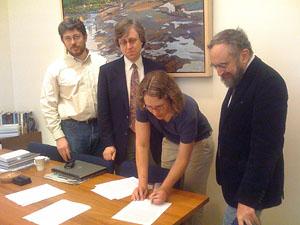June 29, 2009
AMHERST, Mass. — The Anacapa Society, a professional organization promoting research in all areas of theoretical and computational physics at primarily undergraduate institutions (PUI), has found a permanent residence. On June 2, members of the group signed a letter of understanding with Amherst College that formalized its relationship with the school and established the college’s campus as its official home.
 Courtney Lannert, associate professor of physics at Wellesley College, signs the letter of understanding while (r to l) Hampshire College physics professor Herb Bernstein and Amherst’s Gregory Call and William Loinaz observe. |
“Amherst was a natural place for the Anacapa Society,” said the college’s William Loinaz, associate professor of physics, who helped make the arrangement happen. “The Five College area is a hotbed of theoretical physics activity, and Amherst very enthusiastically encourages the scholarship of the faculty. Our relationship with the society and our embrace of its mission only reflects the value that the college places on faculty research.”
“The growth of theoretical physics at undergraduate institutions has been one of the real success stories in academia in recent years,” added Anacapa Society board member Donald Spector, Moorad Professor of Science at Hobart and William Smith Colleges. “By giving the Anacapa Society a home, Amherst is taking a leadership role in ensuring that this growth will continue.”
The origins of the organization date back to a meeting at a 1999 Newton Institute workshop in Cambridge, England. There, four physicists from undergraduate institutions discussed the possibility of forming a group for theorists at liberal arts colleges. Independently, in 2001, three other physicists—including Amherst’s own Robert Hilborn, Amanda and Lisa Cross Professor of Physics, emeritus—worked with the Kavli Institute for Theoretical Physics and its director, David Gross (who won the 2004 Nobel Prize in physics), to sponsor such a gathering of theorists at similar institutions. Loinaz attended that workshop in Santa Barbara, Calif., in July 2003, as well as a second meeting in July 2007 at which the Anacapa Society was officially established. He and Amherst colleague Jonathan Friedman, associate professor of physics, then approached the Amherst administration about hosting and providing the group with the necessary institutional infrastructure and support. The college’s dean of the faculty, Gregory Call, quickly agreed. “Amherst is deeply committed to supporting its faculty’s scholarship, and we are particularly proud of the research accomplishments of our theoretical and experimental physicists,” Call said. “It will be our pleasure to provide a home for the Anacapa Society.”
Amherst has a long history of producing theoretical physicists, including Davison Soper ’65, professor of physics at the University of Oregon, who was awarded the renowned J.J. Sakurai Prize for Theoretical Particle Physics in 2008; William Weisberger ’59, professor emeritus of theoretical physics at Stony Brook University; and David Tucker-Smith ’95, assistant professor of physics at Williams College. In addition, several members of the Amherst physics department faculty are themselves active in theoretical physicists, including Loinaz, Hilborn, Friedman and professor Kannan Jagannathan.
The name “Anacapa Society” is meant to reflect the organization’s origins and mission. Anacapa Island, one of the Channel Islands off the coast of Santa Barbara, is known for its distinctive natural bridge, which serves as a metaphor for the vision of the society: “To connect theoretical physicists at primarily undergraduate institutions with the larger physics and academic communities, while at the same time affirming their distinctive identity.”
Since its official founding in 2007, the Anacapa Society has received at least one National Science Foundation grant, via Hampshire College, one of Amherst’s partners in the Five College Consortium. The funding will support a gathering it will host at Amherst from August 17 to 20. Titled the National Workshop on Theoretical & Computational Physics at PUI, the event will focus on a few critical career stages of a researcher who ends up at a PUI. For more information about the organization, go to www.AnacapaSociety.org.